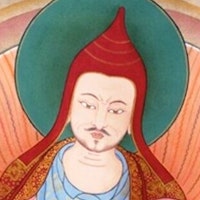But the Supreme Physician does not employ common medical treatments such as these, with an extremely gentle technique He remedies all the greatest sins.
But the Supreme Physician does not employ common medical treatments such as these, with an extremely gentle technique He remedies all the greatest sins.
Shantideva

The Supreme Physician
Topic: Self-Cultivation & Health
Yet the suffering
Involved in my awakening will have a limit;
It is like the suffering of having an incision made
In order to remove and destroy greater pain.Even doctors eliminate illness
With unpleasant medical treatments,
So in order to overcome manifold sufferings
I should be able to put up with some discomfort.But the Supreme Physician does not employ
Common medical treatments such as these,
With an extremely gentle technique
He remedies all the greatest sins.
Shantideva
8th-century Indian philosopher, Buddhist monk, poet, and scholar
Life span
c. 685 - c. 763
Major philosophy
Mādhyamaka philosophy of Nāgārjuna
Place of study
Nalanda mahavihara
Shantideva, born around 685 CE in the ancient kingdom of Saurastra, now part of modern Gujarat, India, was a distinguished Indian Buddhist monk and scholar. He was the son of King Kalyanavarman and was initially named Śantivarman. Shantideva's early life was marked by auspicious signs and a deep inclination towards spirituality. Despite his royal lineage, he renounced his princely duties and chose the monastic life, eventually joining the prestigious Nalanda University. At Nalanda, Shantideva became an adherent of the Madhyamaka philosophy, a profound system of thought developed by Nagarjuna that delves into the nature of existence and the essence of enlightenment.
Shantideva's time at Nalanda was fraught with misunderstanding and controversy. His fellow monks perceived him as disinterested and aloof, often noting his absence from scholarly activities and practice sessions. This perception led to his nickname "Bhusuku," which implied that he only engaged in eating, sleeping, and idling. However, this view of Shantideva was dramatically overturned when he was challenged to give a public discourse. Rising to the occasion, Shantideva delivered "The Way of the Bodhisattva" (Bodhicharyavatara), a text that has since become a cornerstone of Mahayana Buddhist literature. This work, which eloquently addresses the virtues of compassion, wisdom, and patience, revealed his profound understanding and mastery of Buddhist teachings.
Shantideva's legacy extends far beyond his lifetime, which concluded around 763 CE. His teachings, particularly those encapsulated in the Bodhicharyavatara, continue to be studied and revered by Buddhist practitioners and scholars worldwide. The text's practical and philosophical insights have cemented Shantideva's status as one of the most influential figures in Buddhist history. His life and work exemplify the transformative power of inner wisdom and the enduring impact of genuine spiritual practice, offering timeless guidance that transcends cultural and temporal boundaries.
Guide to the Bodhisattva's Way of Life
Wilson, Andrew, editor. World Scripture - a Comparative Anthology of Sacred Texts. Paragon House, 1991, pp. 404-405 [Shantideva, Guide to the Bodhisattva's Way of Life (Bodhisattvacharyavatara) 7.22-2].

Shantideva
Theme: Healing

About This Shantideva Quotation [Commentary]
Acharya Shantideva, the great eighth-century Indian master, presents his perspective on healing in his Guide to the Bodhisattva’s Way of Life (Bodhisattvacharyavatara). The quoted passage, “But the Supreme Physician does not employ common medical treatments such as these, with an extremely gentle technique He remedies all the greatest sins,” highlights the unique approach of a spiritual healer compared to a conventional doctor. Shantideva contrasts the harsh treatments of physical ailments by regular physicians with the compassionate and subtle methods used by the Supreme Physician, a metaphor for an enlightened being or divine healer.
The context elaborates on enduring temporary suffering for long-term relief and healing. Shantideva acknowledges the necessity of unpleasant medical treatments to eliminate illness, likening this to the spiritual discipline required to overcome deeper suffering. He recognizes that the path to awakening involves enduring discomfort, akin to an incision made by a doctor to remove greater pain. This comparison highlights that spiritual growth and healing often require enduring temporary hardships for lasting benefit.
Shantideva’s insight into healing extends beyond the physical realm, addressing profound spiritual and moral suffering. By highlighting the Supreme Physician’s gentle techniques, he emphasizes that true spiritual healing transcends common, more aggressive methods. This gentle approach is seen as superior and more effective in addressing the root causes of suffering, leading to profound transformation and purification. This perspective offers a compassionate and holistic view of healing, suggesting that the most lasting remedies come from gentleness and deep understanding.
Additional Acharya Shantideva Passages
Related Quotes
Copyright © 2017 – 2026 LuminaryQuotes.com About Us